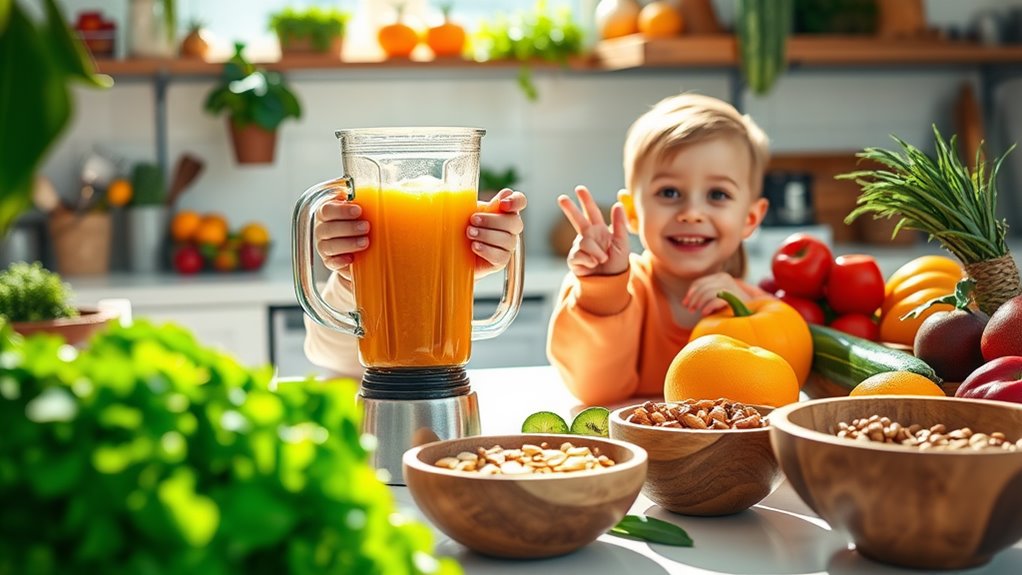Essential Nutrients for Growing Children
When it comes to your child’s growth and development, understanding essential nutrients is key. You might know that proteins, vitamins, minerals, and healthy fats play significant roles, but do you really grasp how each one contributes to their overall well-being? For instance, while calcium is vital for strong bones, other vitamins and minerals also support various bodily functions that are just as important. As you consider how to structure your child’s diet, you may find yourself questioning what specific nutrients are most important at different stages of development.
Importance of Nutrients
Nutrients play an essential role in your child’s growth and development. They’re like the fuel that keeps your little engine running! Just like a car won’t go far without gas, your child needs a variety of nutrients to thrive.
These nutrients include vitamins, minerals, carbohydrates, and fats, all working together like a well-rehearsed team.
Think of vitamins as the cheerleaders of the nutrient world, boosting your child’s immune system and keeping them healthy. Minerals, on the other hand, are the strong teammates, building bones and supporting muscle function.
Carbohydrates give your child the energy to play and learn, while healthy fats help with brain development.
Getting a mix of these nutrients is crucial, and it’s easier than you might think. Colorful fruits and veggies, whole grains, and lean proteins can make meals exciting and nutritious.
Plus, who doesn’t love a rainbow on their plate?
Protein for Growth
When it comes to your child’s growth, protein is a powerhouse nutrient that shouldn’t be overlooked. Think of protein as the building block for your child’s body. It helps create muscles, tissues, and even enzymes that keep everything running smoothly. Without enough protein, your little one mightn’t grow as strong or healthy as they could.
Now, you might wonder how to get enough protein in their diet. Don’t worry! There are plenty of delicious options. Foods like chicken, fish, eggs, beans, and nuts are fantastic sources. Even dairy products like yogurt and cheese pack a protein punch. Kids often love these foods, so you can sneak them into their meals without much fuss.
It’s also important to remember that protein needs can vary based on age, activity level, and overall health. So, keep an eye on their intake, especially if they’re active or growing fast.
Just like a superhero needs the right fuel to save the day, your child needs protein to grow big and strong. So, let’s make sure they’re getting enough of this essential nutrient to support their adventures!
Essential Vitamins
Essential vitamins play a crucial role in your child’s growth and development. These tiny nutrients pack a big punch! They help support your child’s immune system, boost energy levels, and keep their skin looking smooth—no more mystery rashes! Each vitamin has its special job, so it’s important to include a variety in their diet.
Vitamin A is crucial for healthy eyes, while Vitamin C works wonders for their immune system. You can find Vitamin D in sunny spots—like outside or in fortified milk! It helps bones stay strong and is often called the “sunshine vitamin.”
Don’t forget about Vitamin B! This group of vitamins helps convert food into energy, keeping your little one active and ready for playtime. You can find it in whole grains, eggs, and leafy greens.
Make sure your child gets a colorful plate filled with fruits and veggies. Think of it as a rainbow on their plate!
Minerals for Development
Minerals are essential for your child’s growth and overall development. They play a big role in building strong bones, teeth, and muscles. Imagine your child as a superhero, and minerals are their secret weapons!
For instance, calcium helps strengthen bones, while iron keeps their energy levels high. No one wants a sleepy superhero, right?
Zinc is another important mineral that helps with healing and fighting off infections. Think of it as the body’s little defense squad, ready to jump into action.
You mightn’t realize it, but magnesium helps with sleep too, keeping your little one rested and ready for a day of fun.
Encouraging a balanced diet rich in minerals is key. Foods like dairy products, leafy greens, nuts, and whole grains are fantastic choices.
If your child doesn’t enjoy spinach, try sneaking it into a smoothie! It’s all about being creative in the kitchen.
Healthy Fats
Healthy fats are essential for your child’s growth and development. They play a vital role in brain function, hormone production, and overall health. It’s important to include healthy fats in your child’s diet, but that doesn’t mean slathering everything in butter! Instead, think about options like avocados, nuts, seeds, and olive oil. These foods pack a nutritious punch without the added guilt.
Kids need fats for energy, especially if they’re active. Healthy fats can help your little ones feel full and satisfied, which means less snacking on sugary treats. Plus, when you incorporate things like salmon or walnuts, you’re providing omega-3 fatty acids, which are fantastic for their brain development. Who knew fish could help with homework?
Encourage your child to try new foods and flavors. You can even make it fun by creating a “fat-tastic” snack platter with hummus, veggie sticks, and whole-grain crackers.
Hydration Needs
Staying hydrated is essential for your child’s overall health and well-being. Water plays a huge role in everything from digestion to keeping their energy up. Did you know that kids need about 7-8 cups of water a day? That sounds like a lot, but it can be easier than it seems! You can include water-rich foods like fruits and veggies, such as watermelon and cucumbers, to help meet those needs.
It’s important to encourage your child to drink water throughout the day, especially during hot weather or after physical activities. You might want to make it a fun challenge—see who can drink the most water in a week!
Just remember, while juice and milk are great, they shouldn’t replace water as the main beverage. Too much sugar can lead to energy crashes, and nobody likes that!
Also, keep an eye out for signs of dehydration. If your child feels thirsty, has a dry mouth, or seems tired, it’s time for a water break. You can even let them pick a fun water bottle to make it more exciting.
Hydration’s key, so let’s keep those little bodies fueled and happy!




